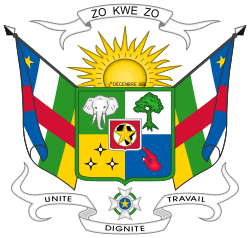LGBT rights in the Central African Republic
Lesbian, gay, bisexual, and transgender (LGBT) persons in the Central African Republic may face legal challenges not experienced by non-LGBT residents. Both male and female same-sex sexual activity is illegal in the Central African Republic and LGBT persons face stigmatization among the broader population. The Central African Republic was one of the few African states that signed a "joint statement on ending acts of violence and related human rights violations based on sexual orientation and gender identity" at the United Nations, condemning violence and discrimination against LGBT people.
 | |
| Status | Illegal |
| Gender identity | No |
| Military | No |
| Discrimination protections | None |
| Family rights | |
| Recognition of relationships | No |
| Restrictions | Same-sex marriage constitutionally banned since 2016 |
| Adoption | No |
Laws regarding same-sex sexual activity
Same-sex sexual activity is illegal under "expressions of love". According to the U.S. Department of State's 2012 human rights report,
The penal code criminalizes consensual same-sex sexual activity. The penalty for "public expression of love" between persons of the same sex is imprisonment for six months to two years or a fine of between 150,000 and 600,000 CFA francs ($300 and $1,200). When one of the participants is a child, the adult may be sentenced to two to five years' imprisonment or a fine of 100,000 to 800,000 CFA francs ($200 and $1,600); however, there were no reports that police arrested or detained persons [in 2012] under these provisions.[1]
Recognition of same sex relationships
There is no legal recognition of same-sex couples.
Same-sex marriage is constitutionally banned as marriage is defined in Article 7 of the Constitution as "the union between one man and one woman ... Family and marriage are under the protection of the State."[2]
Adoption and family planning
According to a website of the French government, single and married people are eligible to adopt children. The website does not say whether single LGBT people are disqualified or not.[3]
Living conditions
The U.S. Department of State's 2012 Human Rights Report found that,
There were no reports of the government targeting gays and lesbians. However, societal discrimination against lesbian, gay, bisexual and transgender persons was entrenched, and many citizens attributed the existence of homosexuality to undue Western influence. There were no known organizations advocating or working on behalf of the lesbian, gay, bisexual, or transgender persons.[1]
Summary table
| Same-sex sexual activity legal | |
| Equal age of consent | |
| Anti-discrimination laws in hate speech and violence | |
| Anti-discrimination laws in employment | |
| Anti-discrimination laws in the provision of goods and services | |
| Same-sex marriage | |
| Recognition of same-sex couples | |
| Step-child adoption by same-sex couples | |
| Joint adoption by same-sex couples | |
| Gays and lesbians allowed to serve openly in the military | |
| Right to change legal gender | |
| Access to IVF for lesbians | |
| Commercial surrogacy for gay male couples | |
| MSMs allowed to donate blood |
References
- "2012 Country Reports on Human Rights Practices: Central African Republic, Bureau of Democracy, Human Rights and Labor, U.S. Department of State, pp. 34–35" (PDF).
- ""Constitution of the Central African Republic", National Assembly of the CAR" (PDF).
- ""Fiches pays Adoption: Centrafrique", France Diplomatie, French Ministry of Foreign Affairs, Google translation".
